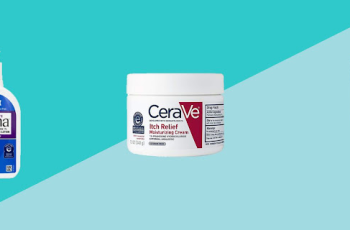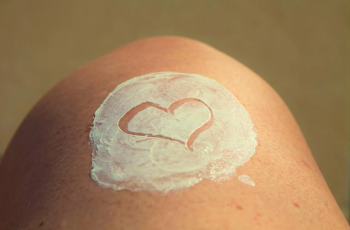Sunscreen is a vital tool in protecting our skin from the harmful effects of the sun’s ultraviolet (UV) rays. However, it’s not uncommon for various myths and misconceptions to circulate around the topic of sunscreens. To help you navigate through the sunscreen maze, let’s shed some light on the most common sunscreen myths and present the facts supported by scientific research. By separating fact from fiction, we can make informed decisions about sun protection and ensure the health and well-being of our skin. So, let’s dive in and discover the truth behind sunscreen 12 myths versus the evidence-based facts.
1 | Myth – Sunscreen is only needed in summer and isn’t necessary if you stay indoors or during cloudy days
👉Fact: UV rays are present year-round and can penetrate clouds and windows (up to 80% can penetrate through clouds). Broad-spectrum sunscreen daily use is recommended to protect the skin against UVB (burning) rays and UVA rays (ageing, oxidative stress, and skin damage).
2 | Myth – Darker skin tones don’t need sunscreen
👉Fact: Although higher melanin levels provide some natural protection, all skin tones are susceptible to sun damage and should use sunscreen regularly. Fair-skinned and red-haired people need to protect themselves more.
3 | Myth – Sunscreen causes vitamin D deficiency
👉Fact: Sunscreen use does not cause Vitamin D deficiency, because Vitamin D intake from sun exposure alone is not enough for the daily required dose. Only when the UV Index is 3 or above (such as during summer), most people maintain adequate vitamin D levels with a daily exposure of 10 to 30 minutes.
4 | Myth – Waterproof sunscreens are effective all-day
👉Fact: No sunscreen is entirely waterproof or sweatproof. It’s essential to reapply sunscreen every two/three hours, especially after swimming or sweating.
5 | Myth – Oral Sunscreen pills can protect from UV rays
👉Fact: Oral sunblock can’t replace a topical sunscreen, rather boost the protection against harmful UV of your sunscreen by limiting oxidative damage from the inside. Oral sunblock usually contains strong antioxidants that can reduce free radicals.
6 | Myth – All sunscreen ingredients are harmful to coral reefs
👉Fact: Not all ingredients are bad for the environment. Some chemical sunscreens ingredients like oxybenzone and octinoxate can contribute to coral bleaching and interfere with the food chain of marine ecosystems. Opt for reef-safe sunscreens with alternative ingredients such as Zinc Oxide and Titanium oxide.
7 | Myth – Applying a high SPF sunscreen means you can stay out in the sun longer
👉Fact: SPF measures protection against UVB rays (and not UVA rays as well), not the duration of sun exposure. Regardless of SPF, regular reapplication every 2/3 hours is recommended.
8 | Myth – Just a high SPF makes a good sunscreen
👉Fact: SPF shields only UVB rays, while you must also shield UVAs. A good sunscreen is broad-spectrum and combines filters for all UV rays. Look for SPF and PA ratings. A good option is SPF 50 + PA +++
9 | Myth – Nano particles are bad
👉Fact: Nanoparticles (i.e. ‘micronized zinc oxide’ on the labels) are smaller than 100 nanometers, so recent research has shown that the skin’s stratum corneum prevents transdermal absorption.
10 | Myth – Zinc oxide causes white cast
👉Fact: The white cast effect of a sunscreen is caused by non nano zinc oxide, as the particles stick onto dry patches of the skin, especially when it is not properly hydrated and moisturized. A good sunscreen formula with hydrating and moisturizing ingredients prevents the dreaded white cast effect.
11 | Myth – Using expired sunscreen is still ok
👉Fact: Sunscreens are lotions that expire like every other skincare products. Expired sunscreen may lose its effectiveness and fail to provide adequate UV protection. It’s best to discard and replace expired sunscreen to ensure proper sun protection.
12 | Myth – Sunscreens with mosquito repellant are good
👉Fact: When sunscreens are formulated with mosquito repellant like Deet (N,N-Diethyl-m-toluamide), their efficacy is significantly diminished – sometimes by more than 30 %. Plus, you may increase the chance of skin irritation.
DQH Knowledge drop: In your 20s, your skin cell turnover decreases. (Cell turnover is a key component in keeping your skin youthful.) You know what else slows down? Your collagen production. Starting in your 20s, collagen decreases by about 1 percent per year. Should you want to prevent fine lines and wrinkles, start by eliminating behaviors that contribute to premature aging. “If it’s bad for you, it’s bad for your skin,” says dermatologist Michel Somenek.
“Cigarette smoking reduces blood flow to the skin and causes premature wrinkling and a dull skin texture. Making the repeated pursed motion to inhale can also cause smoker’s lines. Alcohol and recreational drugs are toxins for the skin that damage its cellular structure and DNA,” Somenek tells us. “The faster you eliminate vices while you are young, the better chance your skin and body have to recuperate.” Also, adopting an anti-aging routine in your 20s is key. After all, the best offense is a good defense. We spoke to Somenek and experts Joshua Ross and Audrey Kunin to find out more.
Keep reading for the best anti-aging products for your 20s, according to skincare professionals.
Sunscreen
“We all know that the sun is the number one cause of skin aging and starting the prevention in your 20s is very important,” Ross says. “The majority of your sun damage won’t start to appear until you’re in your 30s, so don’t wait until you see it surface or you’ll be behind the curve. Stay ahead of it with a good-quality zinc-based sunscreen worn daily.”
Farmacy Green Defense Daily Mineral Sunscreen
An invisible sunscreen with SPF 30, plus botanical extracts meant to protect skin with tons of antioxidants. Bonus: It’s clean and fine to use under makeup.
Bareminerals Complexion Rescue™ Tinted Moisturizer Broad Spectrum SPF 30
Although we recommend you use your SPF and moisturizer separately, we also understand moments when you don’t have time or energy for that extra step. For those times, this bareMinerals moisturizer is a great thing to have on hand.
Vitamin C Serum
“A great introduction to anti-aging is to start with a vitamin C serum in your morning skincare routine,” Ross says. “It’s a powerful antioxidant that will neutralize free radicals and brighten the skin.” He adds that it’s a great way to counteract the effects of the sun’s harmful rays, which, as previously mentioned, are among the biggest causes of premature aging.
Drunk Elephant C-Firma™ Vitamin C Day Serum
The Drunk Elephant C-Firma is a lightweight serum that promises to give skin a glow by combining the brightening powers of vitamin C with ferulic acid, l-ascorbic acid, and vitamin E. The included sodium hyaluronate is meant to replace hydration loss, so you shouldn’t have to deal with any irritation.
Sunday Riley C.E.O. Rapid Flash Brightening Serum
This potent serum is jam-packed with vitamin C (15 percent, to be exact), which means it’s a potential superstar at both brightening skin and dousing it in antioxidants.
Peptides
Using peptides on your skin has many benefits, says Somenek. “The skin barrier is what defends the body against pollution, UV rays, bacteria, and toxins. It can be damaged by several everyday factors. Using topical peptides aids in building a stronger barrier,” he says. “Peptides comprise elastic fibers, which are a type of protein. These fibers help to make skin appear taut and firm. Peptides can also help repair damaged skin, relieve inflammation, and even out skin tone. Some peptides can kill acne-causing bacteria that is common in 20-somethings.”
Kunin agrees, saying, “Peptides are an excellent entry point for supporting collagen.” She recommends looking for face and eye treatments that contain these collagen-boosting powerhouses.
Charlotte Tilbury Magic Eye Rescue Cream
This Charlotte Tilbury super-emollient eye cream has a base of coconut oil and shea butter (read: it’s incredibly hydrating). Botanicals plus peptides are meant to help reduce dark circles and boost collagen, respectively.
This creamy moisturizer serves up potent collagen-boosting peptides and pycnogenol, and antioxidant-rich vitamin C. “Instead of sitting on top of the skin, peptides penetrate the outer layer so they go deep. The ‘signals’ they send tell the cells to produce elastin and collagen, which are needed for youthful-looking skin,” explains Somenek.
At-Home Peel Pads
Remember that skin cell turnover fiasco we talked about earlier? One way to help support it is by exfoliating. “Exfoliation is important to help keep skin fresh and luminous,” Kunin says. She recommends using at-home peel pads as an easy and effective way to exfoliate.
“The goal in your 20s is to fight the slowing pace of cell turnover. It is wise to use products that gently exfoliate, yet still remove oil and other impurities. Products that have Alpha Hydroxy Acids (AHA) or Beta Hydroxy Acids (BHA) are a good choice.”
According to Somenek, you should only exfoliate two to three times a week. “People of all ages are guilty of over-exfoliating and that can be too much of a good thing,” he says.
Dermadoctor Kakadu C Intensive Vitamin C Peel Pad
A few swipes of this Derma Doctor powerful peel pad promise to leave your skin glowing and smooth, thanks to the seven (yes, seven) types of chemical exfoliants, including AHA and BHA. It also contains vitamin C via Kakadu plum extract for added brightening and antioxidant protection.
KEY INGREDIENTS Kakadu plum extract is sourced from the Kakadu plum, a fruit grown in northern Australia. It contains vitamin C, which restores the skin’s natural barrier, increases collagen production, and soothes irritation.
Dr. Dennis Gross Skincare Alpha Beta® Universal Daily Peel Pads
These are the gold standard of peel pads, with a cult following and over 900 five-star reviews on Sephora. They’re easy to use and contain a blend of anti-aging exfoliating acids.
Emollient Night Cream
“In your 20s, you need to start upping the hydration in your skincare routine. You may have been cautious of over-moisturizing because of acne in your teens, but as you enter your 20s, your skin transitions and becomes drier,” Ross says. “I recommend an emollient night cream added into your evening skincare regimen.”
“Twenty-somethings need to make sure that they are not using creams that will clog their pores and cause excess oil production,” says Somenek. Opt for non-comedogenic products.
Cerave Skin Renewing Night Cream
One great choice is the CeraVe Skin Renewing Night Cream, which is a non-comedogenic night cream that leaves skin soft and glowy. It combines the moisturizing powers of ceramides and hyaluronic acid.
RoC Retinol Correxion Max Hydration Creme
“The best night cream ingredients contain retinol, benzoyl peroxide, and/or salicylic acid or hyaluronic acid. The goal is to moisturize, yet remove excess oil,” says Somenek. This Roc Retinol Correxion cream fits the bill as it contains both hyaluronic acid and retinol so it promises to moisturize while also being non-comedogenic.



